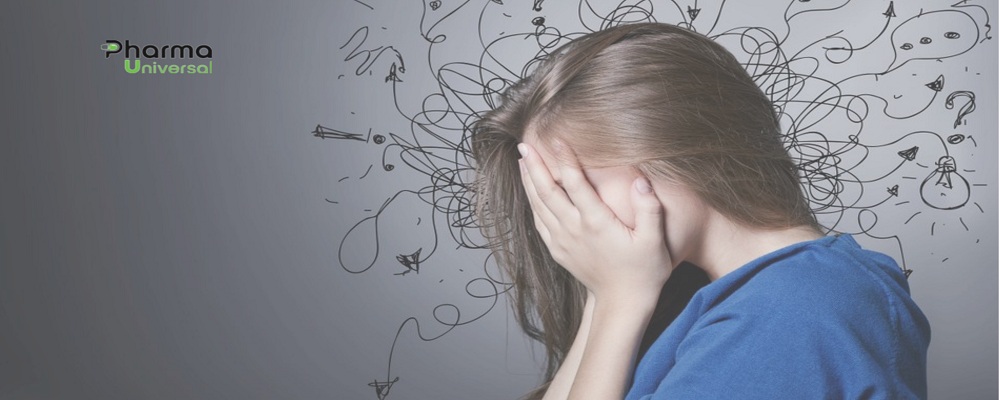What is Anxiety and How Do You Deal With It?
Anxiety is a natural response to stress or apprehension about what’s to come. It’s that feeling of unease, worry, or fear that can vary in intensity from person to person. Dealing with anxiety involves understanding its triggers and learning coping mechanisms to manage its effects. Techniques like deep breathing, mindfulness exercises, regular exercise, and seeking professional help through therapy or counseling are effective ways to navigate and alleviate anxiety.
A person suffering from anxiety, responds to certain situations and things with dread and fear. Though it is common for everyone to have some anxiety. But for those who suffer from anxiety disorders, even experience physical symptoms of anxiety-like sweating and increased heartbeat.
Most people feel nervous or anxious if they have to attend an interview or tackle any problem at work. But a person with an anxiety disorder experiences more nervousness beyond the regular one, and slight fear every time they feel anxious.
Here’s how you can recognize if you are suffering from an anxiety disorder
- Inability to control your response to specific situations
- When your emotions are triggered you overreact.
- Your ability to function will be interfered with by anxiety.
Both genetic and environmental factors can increase the risk of developing anxiety disorders. A person is at higher risk of getting anxiety disorder if they have or had the below-given conditions:
- Traumatic or stressful events have taken place in your childhood or adulthood.
- Specific personality traits, like feeling uncomfortable in unfamiliar situations or around unfamiliar people and the environment.
- Specific physical health conditions like heart arrhythmias (unusual heart rhythms) and thyroid.
What is the 3-3-3 Rule for Anxiety?
The 3-3-3 rule for anxiety is a simple yet powerful technique to regain control when feeling overwhelmed. It involves identifying three things you see, hear, and feel around you in the moment. This practice grounds you in the present, diverting your attention away from anxious thoughts. By focusing on these sensory experiences, it helps to ease the intensity of anxiety and brings a sense of calmness and control.
Does Anxiety Get Worse with Age?
While anxiety can affect individuals of all ages, it doesn’t necessarily worsen with age for everyone. Factors such as life changes, health concerns, and stressors can influence anxiety levels over time. Some individuals may find their anxiety decreases as they learn coping strategies and gain life experience, while others might experience heightened anxiety due to age-related concerns. Seeking support and adopting healthy coping mechanisms remain vital regardless of age.
What Happens if You Ignore Anxiety?
Ignoring anxiety can lead to a variety of consequences that impact mental, emotional, and physical well-being. Unaddressed anxiety may intensify and manifest in more severe symptoms, affecting daily life and relationships. Chronic stress from unmanaged anxiety can also contribute to health issues like high blood pressure, weakened immune function, and sleep disturbances.
Below are the most common types of anxiety disorders,
- Panic disorder
A person suffering from panic disorder experiences sudden and intense panic attacks. These attacks cause intense and stronger feelings when compared to other types of anxiety disorders.
These feelings may either occur unexpectedly or from a trigger, like going through situations you dread. Panic attacks sometimes resemble heart attacks. Hence, if you are experiencing a heart attack, it is ideal to go to the emergency room.
Also, get yourself checked by a healthcare professional from time to time. The physical symptoms of a panic attack are chest pain, pounding heart, a feeling of having a heart attack, and sweating.
- Separation anxiety
Separation anxiety disorder is generally experienced by children or teens. They worry about being separated from their parents or someone they spend time with. This type of anxiety usually goes off with time as they grow older.
- Phobias
Though some of the phobias make sense, there are a few other phobias that disturb a person’s daily routine. A person suffering from any phobia feels anxious every time they have to go through that situation.
- Generalized anxiety disorder (GAD)
People suffering from a generalized help anxiety disorder GAD feel extreme and unrealistic tension and worry even when there is nothing to trigger their emotions. They worry a lot about various situations like work, health, school, and relationships.
They feel that the worry continues from one topic to the other. GAD can cause physical symptoms like difficulty concentrating, sleeping problems, and restlessness.
Here are a few simple ways for coping with anxiety,
- Identify triggers
Record all the situations that make you feel anxious or nervous. Try to avoid these actions or situations as much as possible. And slowly develop strategies to overcome these anxieties.
- Quit smoking and reduce the intake of alcohol and caffeine
- Eat healthy food
A diet that includes fruits, vegetables, whole grains, and fish can help in keeping you far from anxiety disorders.
- Keep yourself physically active
Include exercise in your daily routine. Exercise is a very powerful stress reducer. Start it out gradually and increase your activity.
- Prioritize your sleep
Do get enough sleep every day to make yourself feel rested.
- Stick to your treatment plan
If your doctor has recommended any anxiety medicine, do take them just as prescribed. Never miss any dosage.

